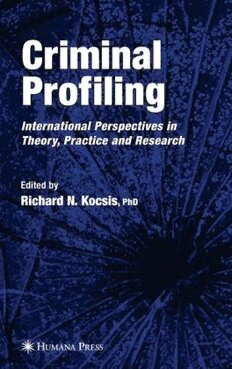
Criminal Profiling: International Theory, Research, and Practice PDF
417 Pages·2007·2.561 MB·English
Most books are stored in the elastic cloud where traffic is expensive. For this reason, we have a limit on daily download.
Preview Criminal Profiling: International Theory, Research, and Practice
Description:
The technique commonly referred to as ‘criminal profiling’ is one in which crime behaviours are evaluated to predict the likely attributes of an offender. In practice, the technique has enjoyed steady growth and interest over the past three decades. The present volume draws together research from scholars and practitioners from across the globe that examines from a range of multidisciplinary perspectives the use, application and value of this form of profiling. The material canvassed throughout this text not only examines research and theoretical principles for the assessment of crimes, but extends to exploring the range of issues facing the theoretical development of criminal profiling and its practical, legal and professional practice. Topics include the examination of homicidal syndromes, the association of crime scene behavior patterns with offender characteristics, criminal propensity and opportunity, the identification of crimes committed by the same offender, the legal admissibility of profiling, its accuracy, and the problems confronting the contemporary practice of criminal profiling. This volume is likely to become an essential reference for forensic practitioners and students alike operating in the fields of criminology, law and policing and anyone with a genuine interest in the investigation and resolution of violent crime.
See more
The list of books you might like
Most books are stored in the elastic cloud where traffic is expensive. For this reason, we have a limit on daily download.
